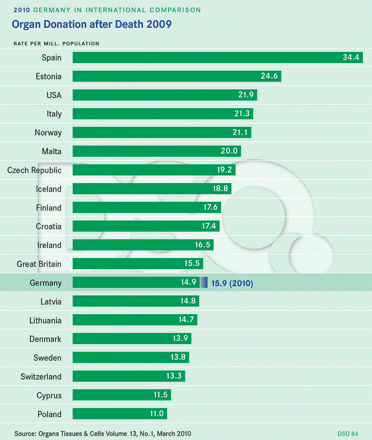-
PDF
- Split View
-
Views
-
Cite
Cite
Frank-Walter Steinmeier, Organ donation is true solidarity, European Journal of Cardio-Thoracic Surgery, Volume 41, Issue 2, February 2012, Pages 240–241, https://doi.org/10.1093/ejcts/ezr157
Close - Share Icon Share
The debate on organ transplantation has returned to Germany. And this is a good thing, considering that about one thousand people in our country die each year who could have survived if an organ from a donor had been available. The number of patients on the waiting list far exceeds the number of organs donated each year. Europe-wide, Germany ranks in the lower middle of the field in terms of the number of organs donated post-mortem [in 2010, 15.9 organs were donated per 1 million inhabitants (see Fig. 1)]. Other European countries—first and foremost Spain—have much better numbers. For this reason, doctors and those affected are rightly demanding reform of the transplantation system in the Federal Republic.

Organ donation after death in 2009. Graph available from Deutsche Stiftung Organtransplantation; www.dso.de.
A year ago, these numbers and facts took on a whole new dimension for me—regardless of the fact that organ donation is something that has occupied my attention for many years now in various functions, both privately and politically. Sometimes, though there are topics that touch us in a completely different way. Since last autumn, when it was in all the papers that I would be the one to donate a kidney to my wife, I have received thousands of e-mails and letters from affected people. From patients who have been waiting for years for an organ. From family members who have lost a loved one who could not be helped in time. From thankful people who have received the gift of a second life through an organ donation.
These experiences have once again made it abundantly clear to me that policy-makers are called upon to act. The example of Spain has shown that functioning organizational processes and a sensible legal framework can contribute considerably to increasing the rate of organ donation. In Spain, for instance, the dissent solution model is used, while in Germany organs can only be removed from deceased persons who have actively consented to organ donation while still alive—or whose relatives consent to organ removal after death (extended consent solution).
It is obvious that the current Transplantation Act of 1997 urgently needs to be amended and organ donation regulations must be adapted. In this connection, many doctors support the introduction of a dissent solution model, as it promises to increase quickly the number of organ donors. From a medical and technical perspective, this demand is understandable—for a politician, however, things are somewhat more complicated.
As we discussed the issue of the Transplantation Act in 1997, this debate stirred up feelings of fear and uncertainty in many people. Above all, these feelings concerned brain death as a criterion to determine death. We know that many people have fears and concerns: am I really dead when they remove my organs? Will everything still be done to save my life even if I am a donor? As the result of these heated debates, it was ultimately no longer possible to achieve anything more than the minimum consensus of a ‘consent solution’.
We must not repeat this mistake. I take people's fears seriously, and I accept that there are those who decide against organ donation for personal, ethical or religious reasons. Organ donation must remain an autonomous decision of the individual and cannot be prescribed by law.
Nevertheless, policy-makers must not submit to these fears. We must take a pro-active stance to gain the acceptance of members of society. We must make it clear that transplants serve to reduce suffering. And that is why I feel that our society can very well expect each individual to at least give some thought to this topic. Organ donation is a sign of true solidarity—and help for those who cannot otherwise be aided!
That is why I am campaigning for a proposal that I call the ‘decision solution’. According to this model, not everyone automatically becomes an organ donor, but we do ask people to decide at least once in their lives either for, or against, becoming an organ donor. What is important is for their decision to then be documented—for instance, in their health insurance cards. In this way, we also relieve family members, who, in an already difficult situation, certainly do not need to be speculating about whether the deceased may have wanted to be an organ donor or not!
The chairpersons of all other parliamentary groups in the German Bundestag share my opinion. Together, we are working on a cross-party bill to amend the Transplantation Act. The topic is too important to be lost in petty party wrangling.
It may not be the best possible solution that many doctors would like to have. They see patients every day whom they could help with an organ transplant, and they are understandably in despair over the insufficient number of donors. Nonetheless, I am convinced that the ‘decision solution’ is a good solution. It fosters acceptance, while lessening the suffering of those affected. In surveys, 70–80% of Germans say that they are willing to donate their organs after they die—but only 15% actually have an organ donor card. We must urgently narrow this serious gap, and the decision solution will help us do it.




